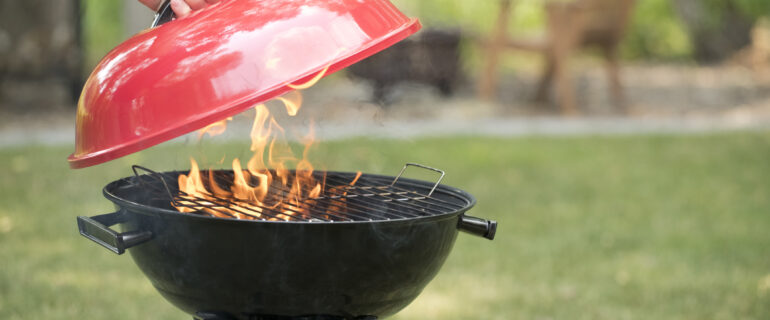Summer is a favourite season for many people — school’s out, days are longer and pools are open.
But the sunny season also has its downsides: extreme weather and heavy use of your outdoor living areas could lead to higher risks of property damage.
To help avoid and minimize damage — and home insurance claims that can increase your premiums — it’s helpful to do some preventive maintenance.
Common summer home insurance claims
While your home requires year-round maintenance, summer presents unique hazards. It’s a good time to address any debris that may have built up in previous seasons or maintenance needs that are harder to address once the snow flies. This way, you can hopefully avoid filing claims for the following issues:
1. Roof damage
Whether it’s hail or a hurricane, summer storms are notoriously hard on roofs, and you may not see the consequences until the storm is over. If you’ve delayed repairing or replacing your roof, one bad storm could cause major damage, potentially ripping off shingles or damaging tile and allowing water to leak inside.
How to avoid it: Inspect your roof at least once a year, and again after each major storm. Check for any loose, missing or cracked shingles, and look for cracks or gaps in the flashing around chimneys or skylights. You should also check your gutters and remove any debris like leaves and twigs so water will drain quickly. If you live in an area prone to storms and you have a skylight, it may be worth installing a storm shutter system.
2. Siding damage
In addition to damaging your roof, a summer storm can also affect your siding, windows and basement. Strong winds could also blow down tree limbs or entire trees, causing further damage to your home and surrounding property.
How to avoid it: Inspect your siding regularly for soft spots and mildew, which can indicate water damage. At the same time, check that the caulk surrounding your windows is secure, and replace it if you notice gaps or peeling. If you have large trees around your property — or on your neighbour’s property — you may want to speak to an arborist about mitigating any potential risks.
3. Outdoor fire damage
Grills, firepits and fireworks put your home at risk of fire damage. The results of a fire-related mishap can be catastrophic, but even minor fire damage can be costly to repair, and you may be forced to move out temporarily.
How to avoid it: Clean your barbecue regularly so there’s a lower chance of a grease fire. Position it well away from your home to prevent any potential fire from spreading. Never leave your grill or firepit unattended, and have a fire extinguisher nearby. Burn dry wood in your firepit and don’t add paper or cardboard, which can become floating ash and can ignite roofs. Fireworks should only be set off in wide-open areas away from homes, and only if allowed by provincial or municipal laws.
4. Swimming pool injuries
Swimming pool owners may love cooling off on hot days, but they may not realize that they’re exposed to additional risk. If your pool is damaged, it could leak and cause water damage to your property. And if someone injures themselves while using your pool or while walking on a wet deck, they could potentially sue you for damages.
How to avoid it: Ensure that your in-ground pool meets all the requirements outlined in your home insurance policy, including adding safety features and having the right permits. Your pool also needs to meet municipal rules and regulations. Maintaining your pool regularly can help prevent leaks and other issues. Finally, if you have guests over, make sure no one swims alone and that you always have someone supervise kids, even if they’re not actively swimming.
5. Burglary
Summer presents more opportunities for burglaries as homeowners are away on vacation or may leave windows open overnight. The last thing you want is to return from a trip to find that your home has been broken into and some of your belongings have been stolen.
How to avoid it: The best way to protect your home is to have some kind of home security system, and it may even save you some money on your home insurance premium. Installing motion-sensor lights and having a friend or neighbour collect your mail while you’re gone can also help deter would-be thieves. Also, avoid advertising your trip on social media — those photos can wait until you’re back home.
Is your home insurance sufficient?
Generally, a home insurance policy will cover all of the above claims, but it’s always important to read your policy’s fine print.
You might need to meet certain conditions to be approved for a claim. For example, your pool must meet all municipal safety regulations and have been disclosed to your insurance company.
It’s worth noting that supplemental coverage could be key to protecting you from summer-related claims. For example, if you live in a third-floor condo, you may assume you won’t need flood protection. However, if you have a storage locker in the basement parking garage, you may want to get this coverage to protect your stored items in the event of a major storm.
Other ways to potentially shrink your home insurance costs include making certain safety-enhancing home improvements and comparison shopping your rates each year when your policy is up for renewal. You might also consider increasing your policy deductible, but only if you’ve properly assessed the risk — the likelihood you might file a claim — and your ability to cover the added cost if something happens.
DIVE EVEN DEEPER

Home Improvement Project? 5 Questions to Ask Before You DIY
Before deciding that you’ll DIY, consider the time, expertise and costs involved to complete your project — and how you’ll pay for it.

Mortgage Payment Calculator
Use our mortgage payment calculator to estimate your monthly mortgage payments in Canada. Enter your loan details to get an accurate and quick assessment of your mortgage costs.

HELOC: What It Is and How It Works
A home equity line of credit, or HELOC, allows you to borrow money using your home equity as collateral. HELOC’s are variable rate loans with interest-only payments.


